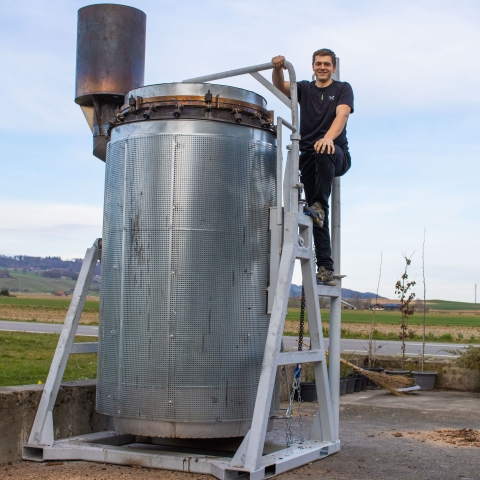Retort for the production of barbecue charcoal and biochar from local waste wood
Charcoal retort
In 2018, Oliver Reinhard, a young forest science student, discovered that most barbecue charcoal bought in Switzerland comes from faraway countries such as Poland or Namibia.
The sources are often obscure and the quality inferior, meaning that a lot of smoke and harmful exhaust gases are produced during combustion.
Oliver has solved the problem by producing his own charcoal from waste from a neighboring sawmill and using a retort with complete exclusion of oxygen. This locally produced barbecue charcoal sells well to sustainability-conscious customers and barbecue professionals.
Регіон походження
2657895
Тип деревини
Перероблена деревина або деревні відходи
Походження деревини
Промисловість
Потенціал для мобілізації
> 20'000 m³ for Switzerland
Тип деревини
Residual and waste wood
Потенціал для сталості
Nutzen regionaler Ressourcen und verbessertes Waldmanagement
Вплив на навколишнє середовище та біорізноманіття
Reduces overexploitation in forests abroad.
Reduces transportation.
Avoids harmful exhaust gases.
Легкість впровадження
Retort must be purchased. Coal production is simple.
Економічний вплив
Added value for the local wood value chain
Вплив на створення робочих місць
Generates local employment
Вплив на створення прибутку
higher margin
Потреба в особливих знаннях
none
Витрати на впровадження (Євро - €)
30000.00 €
Авторські права на зображення
Oliver Reinhard
Основний домен
Продукція, ринки, торгівля
Деревообробна промисловість, біо / циркулярна економіка
Ключові слова
Charcoal upcycling retort
Виклик розглянуто
6. Розвиток лісової біоекономіки за рахунок кругового використання та виробництва з доданою вартості
Цифрові рішення
Ні
Інновація
Так
Країна походження
Швейцарія
Регіон походження
2657895
Масштаби застосування
Регіональний / суб-національний
Початок і кінець року
2023 - 2025Основний веб-сайт
Посилання на проект
Barbecue charcoal and biochar
Веб-сайт проекту
Дата публікації
середа, 3 січня, 2024 - 12:39
Краща практика розроблена в рамках проекту
Rosewood 4.0

